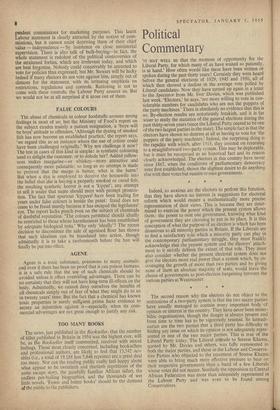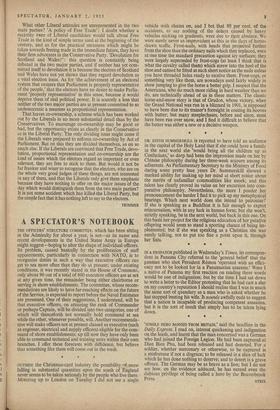Political Commentary
'IT MAY WELL BE that the moment of opportunity for the Liberal Party, for which many of us have waited so patiently, is at hand.' How often words like these have been written or spoken during the past thirty years ! Certainly they were heard before the general elections of 1929, 1945 and 1950, all of which then showed a decline in the average vote polled by Liberal candidates. Now they have turned up again in a letter to the Spectator from Mr. Ivor Davies, which was published last week. 'Electors,' he says, 'are more willing to vote in con- siderable numbers for candidates who are not the puppets of the party machines.' There is absolutely no evidence that this is so. By-election results are notoriously freakish, and it is far wiser to study the statistics of the general elections during the past thirty-seven years (since the Liberal Party ceased to be one of the two largest parties in the state). The simple fact is that the electors have shown no distress at all at having to vote for 'the puppets of the party machines.' Indeed, the surprising thing is the rapidity with which, after 1918, they insisted on returning to a straightforward two-party system. This may be deplorable, but it must be recognised as an historical fact and its reason clearly acknowledged. The electors in this country have never since 1867, when the conditions of parliamentary democracy were first established, shown the slightest desire to do anything else with their votes but sustain or oust governments.
Indeed, so anxious are the electors to perfom this function, that they, have shown no interest in suggestions for electoral reform which would ensure a mathematically more precise representation of their views. This is because they are deter- mined to exercise the power which the present system allows them: the power to oust one government, knowing what kind of government they are choosing to put in its place. It is this conception of what the purpose of an election is which has been disastrous to all minority parties in Britain. If the Liberals are to find a satisfactory role which a minority party can play in the contemporary parliamentary struggle, they must frankly acknowledge that the present system and the electors' attach- ment to it strictly delimit the extent of that role. They must also consider whether the present electoral system does not give the electors more real power than a system which, by en- couraging the growth of more than two parties and by giving none of them an absolute majority of seats, would leave the choice of governments to post-election bargaining between the various parties at Westminster.
* * *
The second reason why the electors do not object to the restrictions of a two-party system is that the two major parties have usually managed to contain every important body cf opinion or interest in the country. They have never been mono- lithic organisations, though the danger is always present and from time to time has to be vigorously resisted. So latitudi- narian are the two parties that a third party has difficulty in finding any issue on which its opinion is not adequately repre- sented in one of the two major parties. This is true of the Liberal Party today. The Liberal attitude to Seretse Khama. quoted by Mr. Davies and others, was fully represented in both the major parties, and those in the Labour and Conserva- tive Parties who objected to the treatment of Serctse Khania were able to bring much more effective pressure to bear on their respective governments than a band of a few Liberals whose votes did not 'matter. Similarly the opposition to Central African Federation was more than adequately represented in the Labour Party and was even to be found among Conservatives. What other Liberal attitudes are unrepresented in the two main parties? 'A policy of Free Trade' : I doubt whether a majority even of Liberal candidates would talk about Free Trade in the kind of simple terms used at the beginning of the century, and as for the practical measures which might be taken towards freeing trade in the immediate future, they have their firm advocates in the Conservative Party. 'Devolution for Scotland and Wales!': this question is constantly being debated in the two major parties, and if neither has yet com- mitted itself to devolution it is because the electors of Scotland and Wales have not yet shown that they regard devolution as a vital election issue. As for 'the achievement of an electoral system that ensures that Parliament is properly representative of the people,' that the electors have no desire to make Parlia- ment 'properly representative' in this sense, because it would deprive them of real political power. It is scarcely a loss that neither of the two major parties are at present committed to so undemocratic a measure as proportional representation.
That leaves co-ownership, a scheme which has been worked out by the Liberals in no more substantial detail than by the Conservatives. To encourage co-ownership may be good or had, but the opportunity exists as clearly in the Conservative as in the Liberal Party. The only dividing issue might come if the Liberals were prepared to enforce co-ownership by Act of Parliament. But on this they are divided themselves, as on so much else. if the Liberals are convinced that Free Trade, devo- lution, proportional representation and co-ownership are the kind of issues which the electors regard as important or even relevant, they are free to stick to them. But would it not be far franker and wiser to recognise that the electors, who are on the whole very good judges of these things, are not interested in any of them, and that the Liberals only give them emphasis because they have nothing to offer on the major issues of the day which would distinguish them from the two main parties? It is not some accident which has killed the Liberal Party, but the simple fact that it has nothing left to say to the electors.
TRIMMER















































 Previous page
Previous page